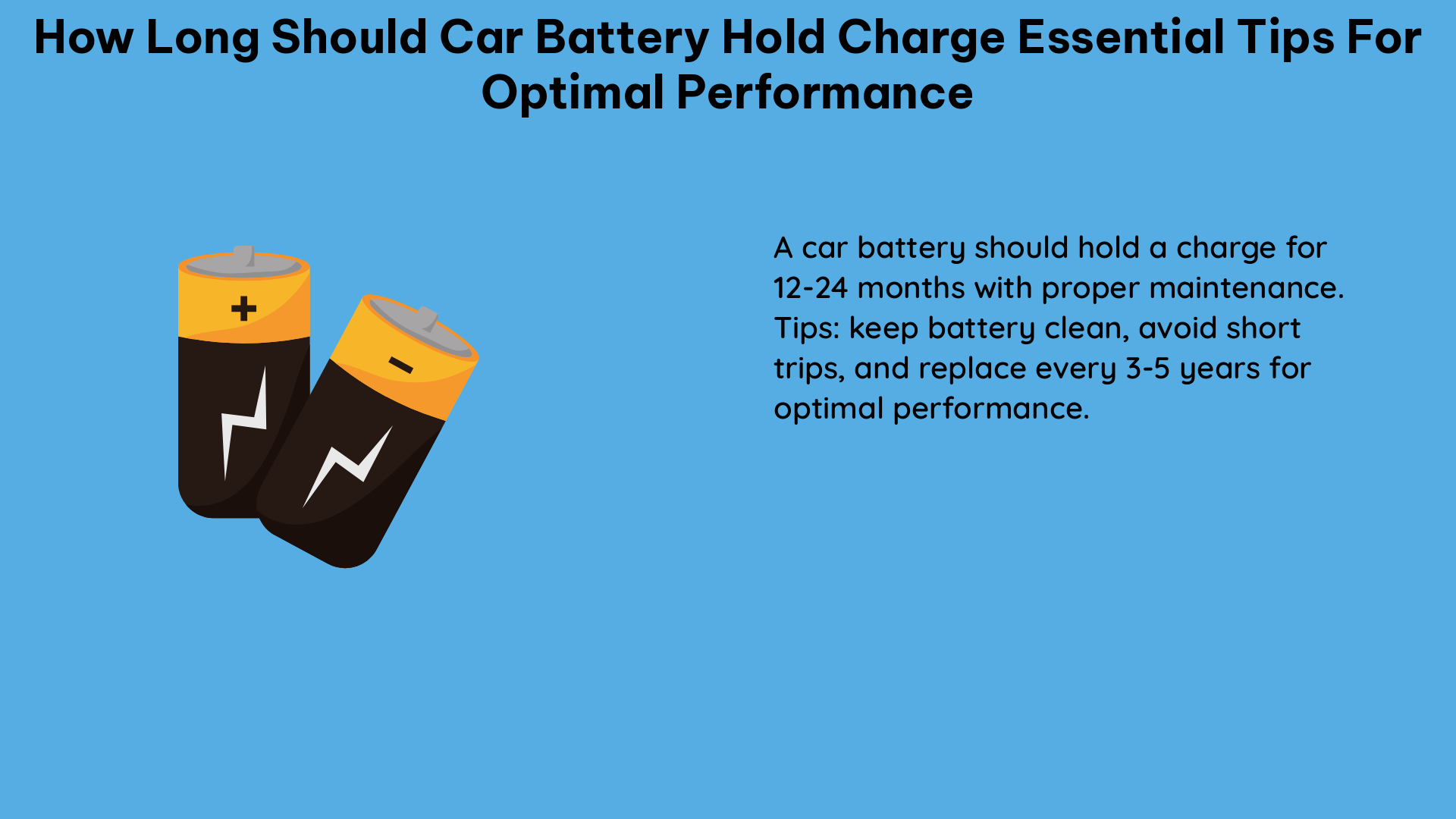A car battery is a crucial component of a vehicle, responsible for powering the electrical system and starting the engine. Ensuring your car battery holds a charge for an optimal duration is essential for maintaining the overall health and performance of your vehicle. In this comprehensive guide, we will delve into the details of how long a car battery should hold a charge and provide essential tips to optimize its performance.
Understanding Car Battery Lifespan
The average lifespan of a car battery can vary depending on several factors, such as driving habits, climate, and maintenance. Generally, a well-maintained car battery can last between 4 to 5 years without any significant issues. However, with proper care and attention, a car battery can potentially last up to 7 to 9 years.
Factors Affecting Car Battery Lifespan
-
Driving Habits: Frequent short trips and excessive idling can put a strain on the battery, leading to a shorter lifespan. Longer drives allow the alternator to recharge the battery more effectively.
-
Climate: Extreme temperatures, both hot and cold, can accelerate the degradation of a car battery. Batteries tend to perform better in moderate climates.
-
Maintenance: Regular maintenance, such as cleaning the battery terminals, checking the water level, and using a battery charger, can significantly extend the battery’s lifespan.
-
Battery Type: Different battery technologies, such as lead-acid, AGM (Absorbent Glass Mat), and lithium-ion, have varying lifespans and performance characteristics.
Optimal Car Battery Charge Duration

To ensure your car battery holds a charge for an extended period, it’s essential to understand the optimal charge duration and voltage levels.
Charge Duration
A fully charged car battery should have a voltage of 12.6 volts or higher. If the voltage drops below 12.6 volts, the battery should be recharged to this level. The time it takes to fully charge a car battery can vary depending on the battery’s capacity and the charging method used.
| Charging Method | Charge Duration |
|---|---|
| Trickle Charger | 12-24 hours |
| Automatic Charger | 4-8 hours |
| Rapid Charger | 30 minutes to 2 hours |
It’s important to note that overcharging a battery can also be detrimental, so it’s recommended to use a charger with a built-in automatic shut-off feature or a float/trickle charger that monitors the battery’s charge level.
Voltage Levels
The voltage of a fully charged car battery should be within the following range:
- Fully Charged: 12.6-12.8 volts
- Partially Charged: 12.4-12.6 volts
- Discharged: 12.0-12.4 volts
- Deeply Discharged: Below 12.0 volts
Maintaining the battery’s voltage within the optimal range is crucial for its longevity and performance.
Essential Tips for Optimal Car Battery Performance
To ensure your car battery holds a charge for as long as possible and performs at its best, follow these essential tips:
-
Fully Charge the Battery: Regularly charge the battery to 100% using a battery charger with a recommended amperage of around 5 amps, such as the NOCO Genius GEN5X1 or Battery Tender 5 AMP.
-
Check the Voltage: Regularly monitor the battery’s voltage to ensure it remains within the optimal range of 12.6-12.8 volts when fully charged.
-
Use a Float/Trickle Charger: Invest in a float/trickle charger to maintain the battery’s charge, especially if the vehicle is not driven frequently. This helps prevent deep discharge and extends the battery’s lifespan.
-
Maintain the Water Level: For non-sealed batteries, check the water level every 6 to 12 months and refill with distilled water as needed to keep the plates submerged.
-
Clean the Battery Terminals: Regularly clean the battery terminals and cables to remove any corrosion or buildup that can impede the flow of electricity and weaken the charge.
-
Check the Battery Tray: Ensure the battery tray is clean and free from dirt, debris, and buildup, as these can drain the battery’s power.
-
Secure the Battery: Make sure the battery is properly secured in the tray to prevent any movement or vibrations that could damage the internal components.
-
Avoid Frequent Short Trips: Minimize the number of short trips, as they can prevent the alternator from fully recharging the battery, leading to a gradual discharge.
-
Monitor the Water Level Indicator: If your car has a battery water level indicator, regularly check it and refill with distilled water as needed.
-
Install an Insulation Blanket: In cold climates, consider installing an insulation blanket or cover to keep the battery warm and prevent premature failure during the winter months.
By following these essential tips, you can maximize the lifespan of your car battery and ensure it holds a charge for an optimal duration, providing reliable performance and starting power for your vehicle.
Conclusion
Maintaining the health and charge of your car battery is crucial for the overall performance and longevity of your vehicle. By understanding the factors that affect battery lifespan, monitoring the charge duration and voltage levels, and implementing the essential tips outlined in this guide, you can extend the life of your car battery and enjoy reliable starting power for years to come.
References
- Reddit – Car Battery Maintenance
- Family Handyman – Tips to Make Your Car Battery Last Longer
- Wiygul – 7 Tips to Maintain Your Vehicle’s Battery
- YouTube – How to Maintain Your Car Battery
- WikiHow – Maintain Car Batteries

The lambdageeks.com Core SME Team is a group of experienced subject matter experts from diverse scientific and technical fields including Physics, Chemistry, Technology,Electronics & Electrical Engineering, Automotive, Mechanical Engineering. Our team collaborates to create high-quality, well-researched articles on a wide range of science and technology topics for the lambdageeks.com website.
All Our Senior SME are having more than 7 Years of experience in the respective fields . They are either Working Industry Professionals or assocaited With different Universities. Refer Our Authors Page to get to know About our Core SMEs.